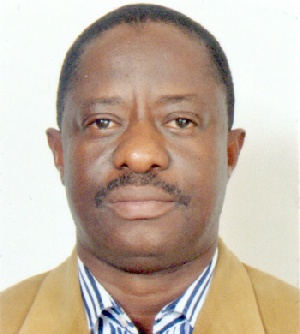- Home - News
- TWI News | TV
- Polls
- Year In Review
- News Archive
- Crime & Punishment
- Politics
- Regional
- Editorial
- Health
- Ghanaians Abroad
- Tabloid
- Africa
- Religion
- Election 2020
- Coronavirus
- News Videos | TV
- Photo Archives
- News Headlines
- Press Release
Business News of Thursday, 7 March 2013
Source: B&FT
Ghana needs 12,000 megawatts - energy expert
To industrilise, energy use in the country has to move from 78 watts per capita to at least 500 watts per capita, which translate into almost 12,500 megawatts of power, John Peter Amewu, Director of Policy and Research at the Africa Centre for Energy Policy (ACEP) has said.
“If we talk of industrialisation, this is how much power every individual would have to use in order for the country to industrialise. In the US is about 3170 watts per capita, in Europe it is about 1700 per capita, in Malaysia 800, in South Africa 900, in Ghana it is 78 – and this 78 is equivalent to two light bulbs,: he told the B&FT in an interview.
“But if Ghana really needs to get to where we think we are going, then we have to get to at least 500 watts per capita – and this translates into almost 12,500 megawatts. We are now about 1, 8 00 megawatts, so we tackle this problem aggressively. We should think very big and stop this piece-meal attitude,” he added.
The country’s objective in achieving universal access to energy services by 2016 however targets 5000 megawatts of power by the said year, a figure that is way below ACEP’s projection.
The energy policy think-tank - ACEP has been on government’s case in recent times, calling for more proactive measures in dealing sustainably with the energy crisis that has bedeviled the country for decades.
ACEP criticised the solution President Mahama held out in his recent State of the Nation address, saying challenges of the energy sector go way beyond his analysis.
In his State of Nation address, President Mahama indicated that government expects addition of over 500 MW of installed generation capacity this year, including 132 MW from Takoradi 3 Thermal Plant by the end of March and 130 MW from the Bui Hydroelectric power Project by the end of April – increasing to 400 MW by the end of September.
He also indicated that the West African Gas Pipeline (WAGPI), whose rupture led to the loss of 250 megawatts of electricity supply to Ghana, is now planned for completion in April this year.
ACEP argues, however, that the WAGPI, when it resumes gas supply, cannot supply the contract requirement of 120million standard cubic feet per day (mmscfd) since it had for a long time been supplying an average of 70 mmscfd, lower than the country’s requirement, and likely to change.
Still, ACEP indicated that the issue of a poor and inefficient distribution network, which has one of the highest distribution losses in the world at about 30%, is even more worrying.
“Thus, the bulk of power generated does not reach consumers – and is not priced for that matter. This has undermined the financial viability of the power utilities. For instance, distribution losses led to more than US$100million revenue losses to the ECG in 2010, which has increased its indebtedness to the VRA and Asogli,” ACEP said.
Emphasising ACEP’s position on the energy crisis, Peter Amewu said government needs to move away from the “piece-meal attitude” and tackle the energy crisis “aggressively”.











